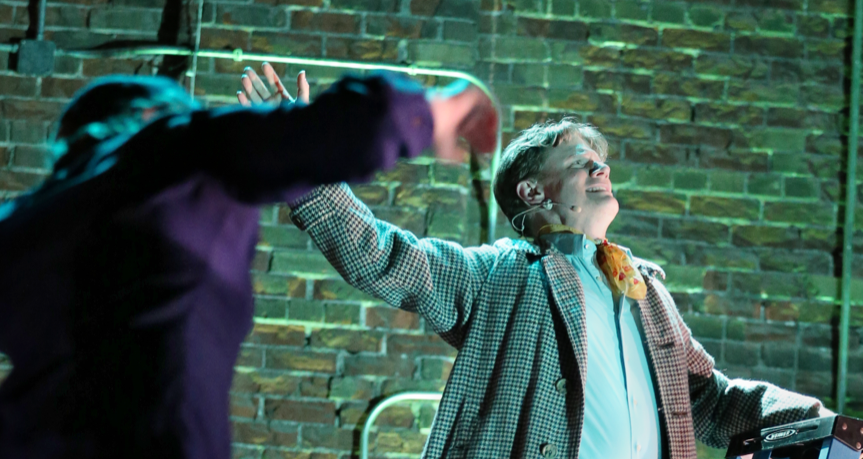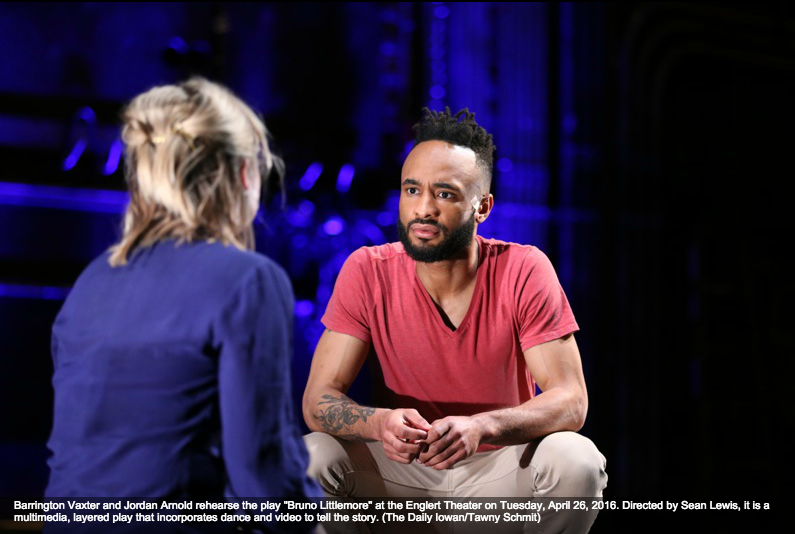On a college campus full of brilliant scholars and intellectuals, can a chimpanzee teach people the most?
Audiences at the Englert Theater, 221 E. Washington St., this weekend are going to find out.
The Evolution of Bruno Littlemore, the Englert’s first commissioned play, tells the story of a gifted chimpanzee under the care of university primatologist Lydia Littlemore. Bruno eventually falls in love with his caregiver.
“[Bruno] begins the narrative by explaining how he’s come to save the audience from their impending destruction by giving them his memoir,” said Barrington Vaxter, the actor playing the title role. “His memoir is that, at one point, he was a chimpanzee, three or four years ago … His hope is that he’s come to share how the laws of evolution and the laws of language should be used so that the people in the audience can evolve, too.”
Despite beginning life as a chimp, Bruno evolves into a type of chimpanzee-human hybrid with passions for painting, philosophy, and music. He tries to contain his original animal nature in pursuit of becoming something truly human.
“[Bruno] has evolved past human beings; he has alienated himself on purpose back in the laboratory after murdering a doctor,” Vaxter said.
Of the 100-page script, adapted by director Sean Lewis from Benjamin Hale’s book of the same name, 70 pages are dominated by Bruno’s thoughts and words.
To balance the linguistic force of Bruno in the show, Lewis brought in various other elements, including video, sound effects, and dancers from the New Territory Dance Company. The added features make it possible to create the “unstageable” play.
“[The dancers] allowed me to abstract the world,” Lewis said. “It’s a really language-heavy piece because the book is huge and is that heavy on the linguistics and word play. If I can use the dancers to use a representational form of that, I don’t have to rely as much on the actors. [I can] get the emotional feel of it; I don’t have to stage a three-minute-long fist fight that becomes a murder.”
Carrying the weight of the show, as the principal character, might make many nervous. Especially given the show is the first commissioned Englert work, possibly paving the way for potential successors. But Vaxter is far from scared. He knows he was meant to play this role.
“I think the same reason that I don’t feel pressure is the same reason [I] don’t feel nervous going on stage,” he said. “You don’t get nervous going on stage because you know you’re supposed to be here; people who pay money to come see you, and that kind of takes away the pressure. I think, as artists, we kind of feed off what people consider pressure because it’s our job. It’s our job to take the issues. It’s our job to do the art and to do it truthfully.”
Click here to check out a photo slideshow of the show.
The role of Bruno is especially important to Vaxter, because he had to fight for the opportunity to play the role.
“We went to workshops, and [Lewis] wasn’t having me play Bruno,” Vaxter said. “[The] reasons … I mean, I’m black and to have someone black play an animal on stage is one of the top five no-nos of theater and performance art.”
It took several workshops for Vaxter to persuade Lewis he was fit for the role.
“But the more I read it, the more it became evident to me that Bruno’s story — of somebody who was taken from their land by foreigners, taken from their family, taken into servitude, and then treated inhumanely and having to overcome that; it became very evident this was not exclusively for me, but it was in part about the struggles anybody who has been oppressed.”
After casting Vaxter as Bruno, he and Lewis began writing essays about why they made this casting decision in anticipation of community response.
“We decided we [would] have a game plan for how we’re going to handle push-back,” Vaxter said. “If you have one ear, you realize that the play is about a lot more than a black man playing an animal … What we had to tackle was writing a message, essays, not necessarily justifying but explaining why it was a good choice for me to play this role.”
Matthew James, a cast member playing numerous roles in the production, said Lewis, despite employing a multitude of performance elements, kept the story at the forefront of the production.
“[It’s] a wild and interesting and thought-provoking night,” James said. “The play is fast-paced and moves quickly. Sean has done a great job making sure that the audience can keep up … The story is still paramount and cut through [the] multimedia, and that the actual effects the story is was most important, and he has done an excellent job.”
Lewis said that above all else, every play should be full of life and “feel like a party.”
“Not nasty like a frat party,” he said. “But in a sense of, like, inviting people and asking them to sit quiet for however long the event is. So there better be enough life on stage that they need to stop their lives. That’s how I think of every piece; if I’m telling you, ‘You shouldn’t text’ and ‘You can’t talk to the person next to you,’ ‘You can’t just get a drink and leave,’ then there has to be so much life happening on stage that it’s worth it for you to experience.”
THEATER
The Evolution of Bruno Littlemore
When: 7:30 p.m. Friday-Saturday, 2 p.m. May 1
Where: Englert Theater, 221 E. Washington
Admission: $10-$25




